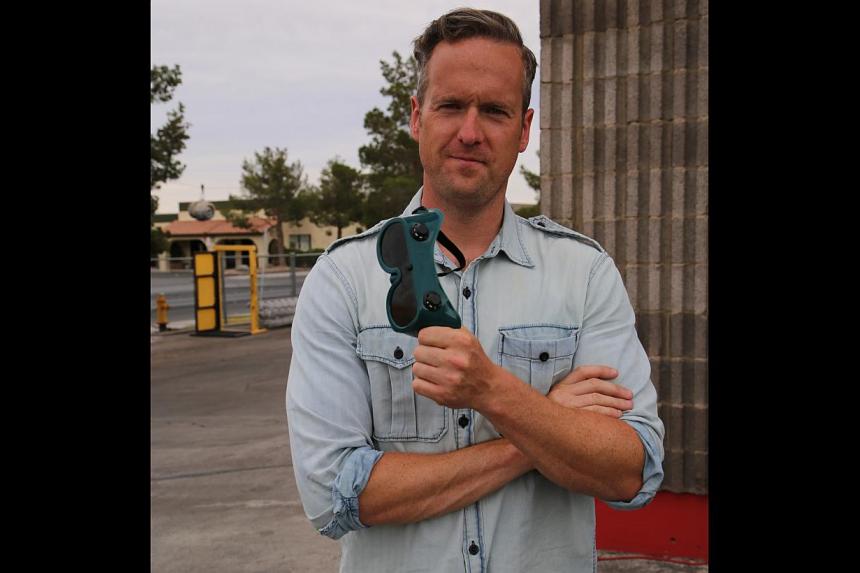British TV host Tim Shaw once angered his wife so much that she sold his luxury sports car on eBay for £0.50.
The then-radio host at rock music radio station Kerrang! Radio had declared on air during his show that he would leave his wife Hayley and their two daughters for bodybuilder and model Jodie Marsh.
Furious, his wife sold his Lotus Espirit Turbo, worth £25,000 then. He later made a live television apology to her and bought the car back for £5,000.
That incident in 2005, which made the news worldwide, was just one of the many infamous ones in his 20-year radio and TV career. That same year, he was suspended from his job for breaking into his boss' home as a prank, and in 2010, he spent 30 days locked in a wardrobe-sized metal box somewhere in the United Kingdom, waiting to be found.
Yet the 40-year-old seems more level-headed than the gimmicks on his resume and says he used to be a geek.
He is currently hosting Street Genius, a pop science and engineering programme. It airs on the National Geographic Channel (SingTel mio TV channel 201 and StarHub TV channel 411) on Wednesday at 10pm.
In the programme, he sets off fire extinguisher rockets, finds out what happens when a person gets vacuum packed and blows up a boulder with an improvised explosive, among other stunts.
He says: "While I was doing radio, I found it very exciting because it was new and challenging. But with TV, I really love that I can combine my engineering hobby and skills with building random gadgets and my obsession with interviewing people."
Shaw, who started designing household products such as rubber ice-cube trays and foldable walking aids at age 15, was named one of the country's Young Engineers Of The Year when he was a mechanical engineering student at Oxford University.
He says: "I was quite geeky in my younger days, spending a lot of time engineering things with my friends and using machinery that people didn't normally use.
"I think finding smaller but interesting things that are not big explosions is exciting and that is the beauty of science. I hope the show can start to motivate people to question how things work."
1 What were you like as a child?
It was a total nightmare for my parents. I learnt by taking things apart and rebuilding them. But they encouraged me to be confident with my hands and that has really benefited me throughout my life.
2 Where did your interest in engineering come from?
Ever since I can remember, I have always been one to question and see how and why things work. But I also did engineering because my father was an engineer, and my parents encouraged me to pursue it.
3 How did you get into radio, given your background in engineering?
I stumbled into it entirely by accident. I liked to listen to the radio when I was a student. One day, my friend challenged me to work my way up in the radio broadcasting industry. After making a call to one of the stations and telling the staff that I was interested in knowing how radio works, I got to work there on weekends.
4 How did you make the transition to TV?
It started when my friends and I built a TV studio together and filmed a show with a very simple interview set-up, featuring people with fascinating stories. Someone from Current TV Channel saw and became interested in the series and the rest is history.
5 How do you come up with unique and sometimes bizarre ideas for your show?
Well, a group of engineers and my friends will sit together to brainstorm ideas, which is the best part for me. Our ideas come from us reverse engineering something that we already know and then creating an experiment out of it. And sometimes, you can get three other experiments from a single one. So you can cover many interesting and complex subjects in unpredictable ways that you do not even know. Plus, the world is developing and there is always new technology to explore.
6 Are there any things to be careful about when you are hosting these science shows?
The only thing I have to take note of is to be careful with my experiments. I am always aware of people who imitate what they see on TV shows, so I have to make it a point to not elaborately explain certain experiments that involve explosives or have explosive results.
I also have to make my experiments more extreme so that it is not something that people or children can concoct in their kitchen, or that can put humans and nature at risk.
7 What kind of show would you like to host in the future?
I would like to do a more down-to-earth show. I have always been encouraged to ask about and challenge things while I was growing up. I feel that there is no need to have qualifications but you just need to explore the world.
Most engineers are too technical when explaining things and that terrifies people and pushes them away from the science. So I try to explain things in simple, everyday language.
The most important thing is that everyone, from the child to the adult to the grandma, can understand what I am saying.
8 How would you like to be remembered?
I believe that I have been given a set of abilities and talent, and I just want to keep on spreading all this knowledge.
So I don't want to be a human being to be remembered but, more importantly, I want the science on the show to be remembered.
Street Genius airs on National Geographic Channel (SingTel mio TV Channel 201 and StarHub TV Channel 411) on Wednesday at 10pm.

